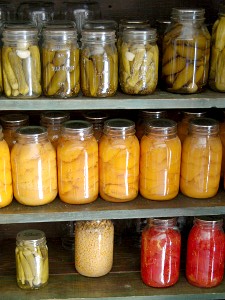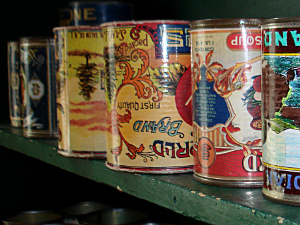The financial pros and cons for building up a food store/pantry
Writing about my “I’ll keep a store cupboard in case zombies attack!” paranoia yesterday (ahem) reminded me that I wrote something for a personal finance website last year but for some reason, didn’t get around to sending it over. I’ve re-edited it to make it suitable for here/now but have kept it purely about the financial side of things. I would love to hear your thoughts on it.
Over the last few years, we seem to be experiencing more and more cases of extreme weather and natural disasters. This year in the UK, we’ve had an unusually wet summer, leading to flooding, and elsewhere around the northern hemisphere, it’s been too hot, which has caused fires. There have also been unseasonal hurricanes/tornados, and while we’ve been comparatively lucky so far this year, 2011 was horrendous for other natural disasters such as the earthquakes in New Zealand and the earthquake/tsunami in Japan.
There’s no question that having a small supply for food and water is essential if bad weather is predicted and it’s important to maintain emergency supplies in case an unforeseen disaster strikes. But I’ve recently been considering the financial pros and cons of keeping a larger store pantry.
Why it makes financial sense to keep a large food store at home
 Aside from the security of having emergency supplies when needed, the largest day-to-day benefits of maintaining a large store at home are the financial ones. Many people with large food stores grow and/or preserve a lot of their own food when it’s in season so have put-up supplies that are a lot cheaper than it would cost to buy them ready-made in the shops/out of season.
Aside from the security of having emergency supplies when needed, the largest day-to-day benefits of maintaining a large store at home are the financial ones. Many people with large food stores grow and/or preserve a lot of their own food when it’s in season so have put-up supplies that are a lot cheaper than it would cost to buy them ready-made in the shops/out of season.
Certain items (such as sacks of wheat berries, dried pulses or rice) can be bulk bought, resulting in a cheaper cost-per-serving, and in many places can also be bought direct from the producer or through a not-for-profit co-op, cutting the price even further.
Having a well-stocked store and list of “store-cupboard recipes” should also reduce the amount of times/frequency with which you visit your local supermarket. When you shop your own pantry, you’re not going to get persuaded to part with a few pounds on unnecessary temptations and treats. Depending on how far you are from your local shops, that may also save a considerable amount of money in fuel/public transport costs too, as well as time.
As well as saving money directly and indirectly in the first place, a large pantry is also essentially a saving scheme. In the UK interest rates on savings accounts are considerably lower than the rate of inflation so our bank savings are actually shrinking in real terms while food prices are rising. Items bulk-bought a year ago will have been cheaper in both ways: the sticker price will have been less and our actual money will have gone further too.
When keeping a large food store at home can cost you money
 However, while our bank savings may be slowly shrinking, at least they’re not risk of going stale, mouldy or being eaten by rodents (or at least I hope not). Of course, those risks can be minimised with good stock rotation and appropriate storage containers – but purpose-bought storage containers can be expensive. Admittedly they’re reusable and you should get years of use from them but there is still an initial start-up cost. In fact, every aspect of creating a store cupboard involves upfront spending that some people may not be able to afford while living hand-to-mouth. It also requires ongoing maintenance and attention, time which might be better spent saving money elsewhere or increasing the household income someway.
However, while our bank savings may be slowly shrinking, at least they’re not risk of going stale, mouldy or being eaten by rodents (or at least I hope not). Of course, those risks can be minimised with good stock rotation and appropriate storage containers – but purpose-bought storage containers can be expensive. Admittedly they’re reusable and you should get years of use from them but there is still an initial start-up cost. In fact, every aspect of creating a store cupboard involves upfront spending that some people may not be able to afford while living hand-to-mouth. It also requires ongoing maintenance and attention, time which might be better spent saving money elsewhere or increasing the household income someway.
In places with very hot summers and cold or damp winters, extra care has to be taken about where the store is located to avoid spoilage – in practical terms, that generally means in air-conditioned/heated parts of the house rather than in an outhouse or garage. There are plenty of clever tips to “hide” bulk-bought items around the home but your heating/cooling bills may increase if you have to control temperature for the sake of the food when you’d ordinarily be out of the house (eg, during the day or on holiday). Food stored in freezers is obviously less affected by seasonal fluctuations but has a year-long power cost that should be considered: new, efficient freezers in suitable locations in the home are pretty cheap really but older, less efficient freezers cost far more to run. We usually keep our freezer well-stocked, with batch home-cooked “ready meals” and direct-from-the-local-farmer organic meat, which we buy in bulk but is still pretty expensive. If the freezer broke or we lost power for an extended period of time, we’d lose (or have to use ASAP) meat which represents a considerable amount of money. (Our household insurance would cover it, but with our excess, it wouldn’t be worth claiming.)
Aside from spoilage worries, tastes also change (especially in children) and dietary issues/allergies can develop, which could result in a lot of food you can no longer eat. If the food is still good, just no longer wanted, you could sell or barter the excess for something you can still eat – but there is still a chance that you’ll be left with money locked up in food that’ll ultimately go in the bin.
Are there any financial pros/cons on building up a food store/pantry that I’ve missed? Do you have any tips for setting up/maintaining a larder from a financial point of view?
(Can photo by CWMGary)
Read MoreDo you darn?
These are the socks I’m wearing today:
(Well, the “undersocks” I’m wearing today – I’ve got some big fluffy ones on top – I feel nude if I’m wearing less than two pairs of socks in winter :) )
I’m good at stitching up small holes in socks but when it comes to threadbare patches like these … well, there’s a reason why these threadbare bits are so big!
I’m always more inclined to fix thick socks than this thin sort as I don’t think my needle skillz could manage a very good job on these. But a whole load of my socks have gone this way recently (especially “novelty” ones like these, which I got as Christmas presents when I still got Christmas presents a decade ago) and I’m thinking I need to do something about it — because my sock drawer is rather depleted and I’ve used up all my old worn-out sock reuse/recycling ideas for the time being.
So do you darn? How easy is it to learn how to do it properly/neatly? Would you darn this type of sock or save your time for better quality ones?
Read MorePortion control
 I was in a bit of a sleep daze when I had a shower yesterday and accidentally lathered, rinsed and repeated. I’m not a girl who usually repeats, no matter what the side of the bottle says, but it reminded me of an old article that I re-read recently.
I was in a bit of a sleep daze when I had a shower yesterday and accidentally lathered, rinsed and repeated. I’m not a girl who usually repeats, no matter what the side of the bottle says, but it reminded me of an old article that I re-read recently.
The article was about portion control – not food portion control for dietary reasons but other things for frugal reasons. The article starts at the point where the author, JD, realised he could try putting two teaspoons of cocoa into his cup rather than the recommended three and seeing if it made a noticeable difference. It didn’t – or not enough that he cared – and would save him about 29c a day. It made him start looking at other things to spot the difference between the manufacturer recommended amount and what was actually needed – because obviously the manufacturers have a vested interest in people using more than they need. He advocates that people start reducing quantities of various things (like shampoo, toothpaste & washing powder) until they notice a difference – it’s not about compromising on standards, just not using unnecessarily big portions of things when a smaller amount will get the job done just the same.
I’m going to try experimenting with some things – especially things that are now said to be concentrated (squash/cordial & washing up liquid are two things that spring to mind) because I think old pre-concentrated habits can easily lead me to use too much. I think I’ll also drop the amount of shampoo I use – less for each wash and definitely no more sleepy repeats ;) – and face cleanser/moisturiser to see if that makes a difference. And in the kitchen, I’m going to play with using powder bouillon (rather than set size stock cubes) and stock dilution levels to see if it makes much of a difference once we’ve added all our other flavours and spices on top.
Have you noticed you can use less of something than manufacturers suggest? Have you tried reducing the amount of something – good results/bad results? Have you noticed having to change the amounts used as products get better/worse? Do you use too large quantities of things out of habit?
I’d love to hear your thoughts and experiences on this!
Read MoreBuy less than 12 items of clothing in 2011 challenge – end of year update
This morning I tweeted that I think it’s going to take me most of 2012 to catch up on all my leftover stuff from 2011 – and this is one of those things!
The Challenge
Last year, I set myself the challenge of buying no more than 12 items of clothing in 2011 – and I invited other people to join me. A good number of people signed up (or committed themselves to similar goals).
What I bought
I went until July (which was a full nine months since I’d bought any new clothes) before buying anything then raced up to 11 things by October!
I bought:
- 1 x a woolly hoodie jumper from a charity shop
- 4 x jeans from eBay (mostly replacements for old ones falling apart – I wear jeans all day, every day)
- 1 x light cardigan from a high street store
- 2 x t-shirts from Threadless
- 2 x long-sleeved tops from a high street store
- 1 x a cord jacket from a charity shop
I can’t tell you how many things I watched on eBay, or added to basket on other online shops, or considered at in-person shops – it was a LOT but I only bought those 11 things. By and large, I thought a lot more carefully about what I was buying because I didn’t want to go over my limit. That said: I still made impulse buys and mistakes. I love the cord jacket I got in October but that was a mistake: I’d spent most of the year trying to find the perfect spring/autumn jacket on eBay but then impulse bought the jacket at a charity shop even though it didn’t have a hood (which was a key thing for me) — I’ve been rained on so many times since then! The biggest mistake though was the Threadless t-shirts I bought in September – I’ve had t-shirts from there before and they’ve been decent quality; this batch though are awful — incorrectly sized, shoddy fabric, poor stitching = unwearable. It really annoys me that I wasted two of my quota on them! GRRR!
(The jacket, with the reason I keep getting rained on asleep in the background ;) )
Lessons learnt
Read MoreWashing in winter: ideas for reducing laundry?
 Hi guys, sorry for the radio silence for the last few days – I went on a drama training course on Tuesday and have only just recovered ;) It was a lot of fun and very useful but I’m farrrrr too lazy for what was essentially a five hour exercise class. My neck is sore and I’ve a huge bruise on my knee from stage combat training but on the other hand, pretending to beat up a new colleague for 2.5hrs is a really good bonding experience :)
Hi guys, sorry for the radio silence for the last few days – I went on a drama training course on Tuesday and have only just recovered ;) It was a lot of fun and very useful but I’m farrrrr too lazy for what was essentially a five hour exercise class. My neck is sore and I’ve a huge bruise on my knee from stage combat training but on the other hand, pretending to beat up a new colleague for 2.5hrs is a really good bonding experience :)
ANYWAY, back to reality now. Lazy, lazy reality. I do like being lazy in winter because it can actually be an efficient/frugal way to do things: yesterday, John was out of the house all day so me & my aching body worked from bed until I had to go to out myself – no need for heating. And as I’ve said before when talking about linedrying laundry in winter, some things just get left until spring: throws/blankets get taken out of service, occasional wear that I won’t need for another few months can stay in the washing basket, and bedding etc gets left in the washing basket too until a nice drying-outside day, even if that’s another month (or longer) away. Lazy is good.
But I wondered what other strategies people use for reducing the amount of laundry they have to get through in winter. Aside from burst washing machine pipe incidents, the washing isn’t the hard part but the line drying is, particularly if you’re tight on space at home.
I remember looking into the issue of laundry a year or so ago and being shocked how much people wash clothes – a whole outfit in the wash every day – some people wash bedsheets & tumble dry every day. I mean, gosh! Around here, underwear gets changed every day, t-shirts every other day, jeans & jumpers not so much. They get washed when they’re dirty, which isn’t after one day for us desk jockeys. I also have different sets of clothes for different jobs – for example, my scruffs (for gardening/chicken coop cleaning/DIY) have a much higher dirtiness threshold than the nicer clothes I wear when I’m teaching.
How about you? Do you try to minimise the amount of washing you do in the winter (or all year around)? If so, what tactics do you use? If you don’t – how do you keep on top of it all in the cold days of winter?
Read MorePonderings #1 – on pennies
 This was originally going to be a much longer post on two vaguely connected things but I think it confused the issue lumping them together, so I’ve split it up – pennies today, the other thing tomorrow.
This was originally going to be a much longer post on two vaguely connected things but I think it confused the issue lumping them together, so I’ve split it up – pennies today, the other thing tomorrow.
A few weeks ago, there was an interesting article on Get Rich Slowly about picking up pennies. (I’ve linked to GRS a few times recently – the US-centric investment/credit card advice and similar that was very common when I started reading it has recently dropped off and now it’s mostly just good frugal living advice.)
So this article was about why the author Donna Freedman picks up pennies from she sees them on the ground. She talks about why the “ewww, it’s dirty” argument is just silly and the best places to look for spare coins, but the most interesting thing for me was when she talks about what she does with them: she saves them up in a jar and donates them to a food bank –
according to the hunger-relief charity Feeding America, $1 provides the makings for eight meals. I keep that in mind every time I pick up a penny: Another 99 of these and eight people get to have supper.
I used to pick up pennies all the time. I think I probably stopped about six years ago now, when I was still in full time employment and those pennies didn’t mean that much to me any more – or rather, I knew that they’d mean more to other people. We lived in a poor estate in a poor area so it seemed to be rude for me to take them when they could make more of a difference to someone on a tight budget. I still think this is a valid point but I do like Donna’s idea too – she collected $44.58 last year, which she rounded up to $50, and that provided food for 400 people: who knows how much of that money would have been picked up by someone who needed it, instead of being picked up by someone who didn’t really need it, or possibly getting washed or swept away and be lost to everyone forever?
Changing the topic slightly, we’ve always had penny pots at home – silver ones which are plundered for bus fare all the time, copper ones that are filled and counted while watching a film on a wintery afternoon – and it surprises me when I hear that other people don’t have them. At the far end of the scale, a friend of a friend THROWS AWAY ALL HIS CHANGE, as he puts it in the BIN, not in a jar for counting later or a charity bucket. He’s successful in business and I imagine his reckoning is that it’s not worth his time to find a jar, drop the coins in there every day and take it to his bank/Coinstar/a charity collection once a year. If he wanted to give the equivalent money to charity, he could argue that he would be better spending his time – those seconds that add up – adding value to his business, because that would probably mean he was able to donate more money in the long run. Since finding out about that, I’ve heard of examples of at least two people who do the same – and it had never occurred to one of them that he could collect them up rather than just THROWING MONEY AWAY. I think my capital letters show how aghast I am about this idea!
Do you pick up pennies on the street for yourself or for charity, or do you leave them where they are? Do you have a penny jar at home? Are you as shocked as I am about the people throwing money in the bin?! I’d love to hear your thoughts on this :)
Read More







